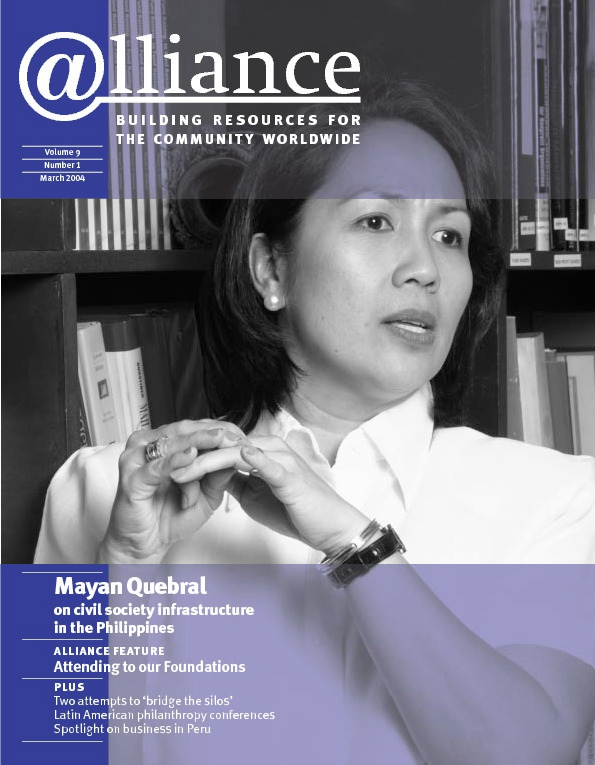In an inspiring keynote address to the Community Foundation Symposium in Berlin in December 2004, Emmett Carson, President of the US-based Minneapolis Foundation, called on community foundations the world over to ‘take the road less travelled’ and transform themselves into what he called a global movement for social justice.[1] Almost a year later, Alliance asked him whether he felt anything concrete had come of this.
Have you seen changes in the community foundation world since Berlin?
The short answer is yes. The speech seems to have come at the right time in the development of community foundations worldwide as a growing number believe that social justice should be at the core of their work. I’ve heard from colleagues saying they’ve used the speech with their boards of trustees and with their public constituencies to talk about the work they hope to do, or who want to infuse the social justice theme into the programmes of their organizations. I’ve been overwhelmed with the energy of people to put this on the community foundation agenda.
I was very pleased that at the recent annual meeting of community foundations in the US Avila Kilmurray[2] was the closing keynote speaker. Her work I think epitomizes the importance of social justice work in a community.
So what you said has really started people talking and thinking in a different way?
Yes, I’ve heard from people that they usually go to conferences and social justice is on the fringe. In Berlin, it was at the centre of the discussion, and I think in a way my speech has come to symbolize the start of a different discussion and agenda for community foundations. The challenge now is to increase the support and understanding for this kind of work and to create tangible examples of how to do it.
What would you like to see happening next?
At the close of the US community foundation conference, a group of international colleagues came together and asked, how do we build on the Berlin conference to sustain a movement for social justice? We began to talk about strategies to create the intellectual capital to enable people to talk about this. We talked about creating a speakers’ bureau and a team of international advisers to help community foundations think through how to implement a social justice agenda.
A speakers’ bureau would enable us to have a ready list of people who could help put social justice on the agenda at meetings around the world. I believe there is a readiness in the field but that readiness needs to be encouraged and mobilized. I’ve often found that as an outsider I have more credibility than people inside the community. I think I saw that proven again with Avila’s speech to my colleagues here in the US. Coming from another context, another vantage point, I think they could hear her words far more clearly than they would have heard mine.
We also talked about identifying one or two themes that we might encourage a group of community foundations in different countries to take on as part of the social justice agenda. I suggested immigration and migration because these themes remind us very vividly that we now live in an international community – many communities are hostile towards people who are different. In this way we could share experiences and explore how to have our communities embrace diversity rather than simply tolerate it or be hostile to it.
So the next step after enthusing people is practical, almost like technical assistance for social justice?
Well, I see two things. One is advocacy for social justice – I think we’ve got a core of people who believe that this is the right approach and there are many more that we can encourage to come into the social justice tent. The second issue is how to go about it. Doing social justice work isn’t easy, so it may happen that people have the will but don’t know how to do it. I think we can show people that this work is infinitely more rewarding than traditional grantmaking.
To succeed, we will need to do several things. We have to find ways to get articles in publications such as this. We need case studies of organizations that are doing it effectively and well. We need speakers who can talk to its importance and energize people. We need technical assistance experts who can sit down with particular communities and listen to them and give examples from their experience and have the local people figure out how to translate those experiences into their context.
So we’ve got to work on a couple of different fronts, but I think for the first time there is a core of international people who are committed to this work. The discussion is certainly under way.
That’s really encouraging.
Well, I’m encouraged – and excited by the possibilities!
1 See Alliance, Vol 10, No 1, March 2005.
2 Avila Kilmurray is Director of the Community Foundation for Northern Ireland.
Emmett Carson is President and CEO of the Minneapolis Foundation. He can be contacted at edcarson@mplsfoundation.org






Comments (0)